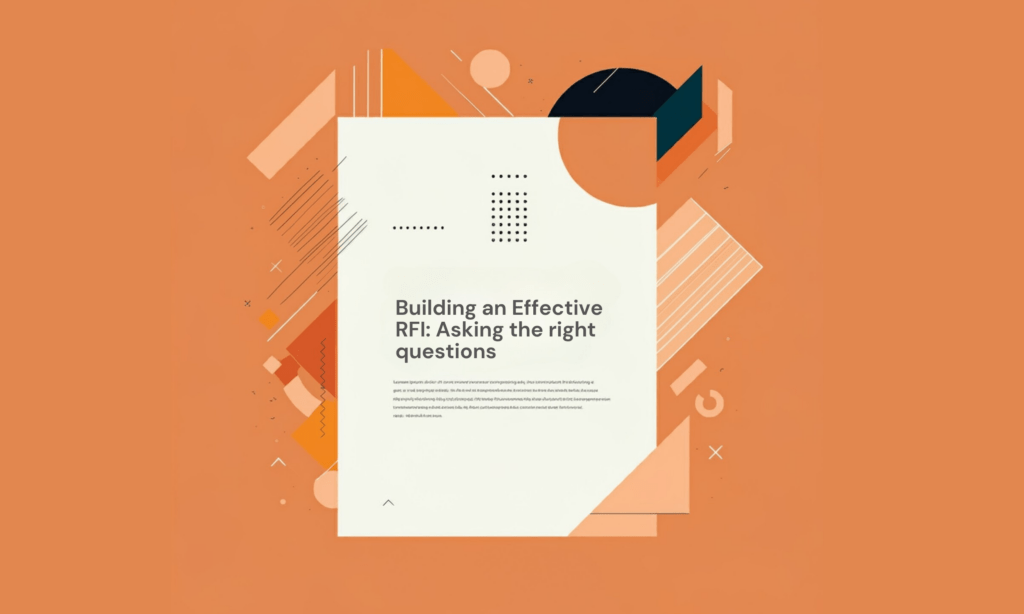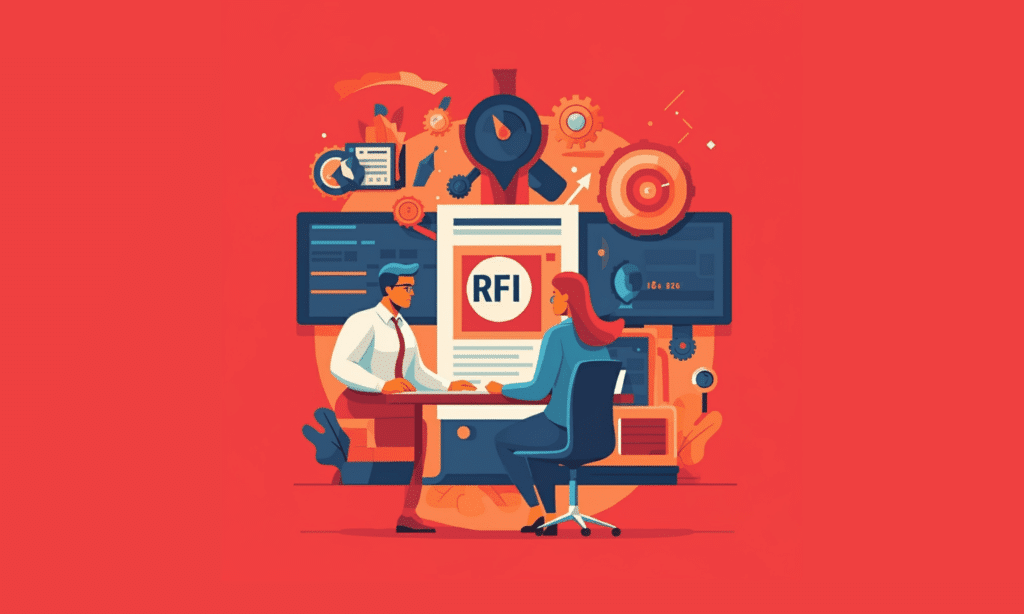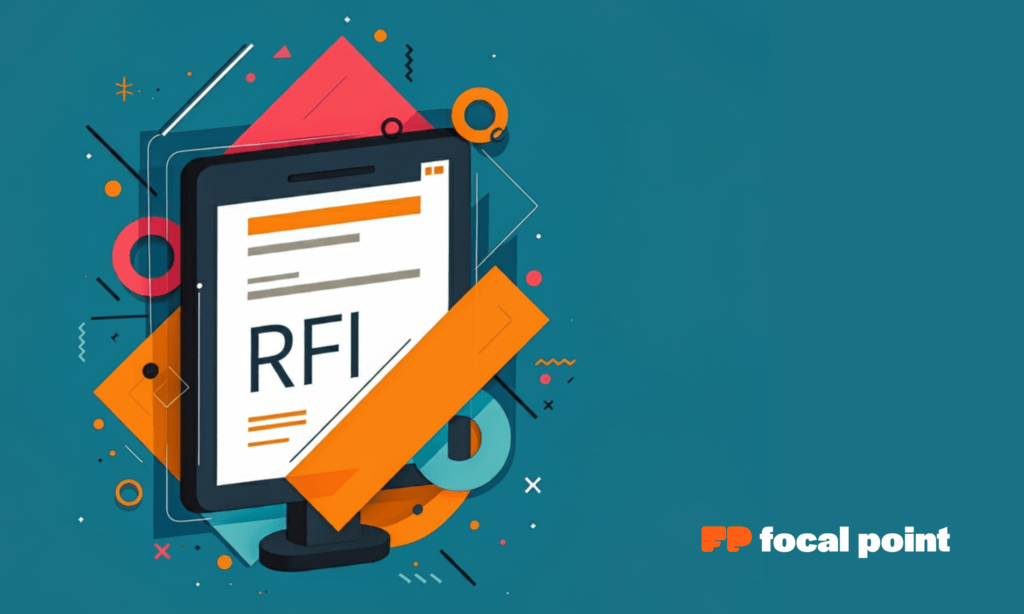Are you preparing to send out a request for proposal (RFP) but feeling unsure about what questions to include? Crafting the perfect RFP can be daunting, especially when the project’s success depends on finding the right vendor. But fear not! By asking the right questions in your RFP, you can significantly increase your chances of receiving high-quality proposals that meet your specific needs.
Studies show that including the right questions in your RFP can make a significant difference in the quality of responses you receive. In fact, research indicates that RFPs with well-crafted questions are 35% more likely to result in successful partnerships compared to those with generic or poorly structured inquiries. Moreover, 82% of clients appreciate when vendors provide detailed and relevant answers to their RFP questions, as it demonstrates a deeper understanding of their requirements.
To help you navigate the RFP process more effectively, we’ve compiled a comprehensive list of top questions to include in your RFP template. From evaluating a vendor’s industry experience and expertise to assessing their customer support and service level agreements, these questions will help you gather the insights you need to make an informed decision. By incorporating these essential inquiries into your RFP, you’ll be better equipped to find the perfect partner for your project and achieve long-term success.
Key Takeaways:
- Asking the right questions in your RFP can significantly improve the quality of vendor responses
- Well-crafted RFP questions lead to a 35% higher success rate in finding the ideal partner
- 82% of clients value detailed and relevant answers from vendors in RFP responses
- Including questions about industry experience, customer support, and service level agreements is crucial
- A comprehensive list of top RFP questions can help you make an informed decision and achieve long-term success
Understanding the Importance of Asking the Right RFP Questions
Creating an effective RFP is a complex task that demands meticulous planning and input from essential stakeholders. Research indicates that 84% of clients believe it’s vital to align project goals with the company’s broader objectives before starting the RFP process. This alignment ensures the chosen vendor can fulfill the organization’s strategic goals.

It’s crucial to formulate the right questions for potential vendors when preparing an RFP. These questions should blend project-specific inquiries from stakeholders with standard RFP questions covering common concerns. Companies that define project requirements before the RFP phase see a 70% boost in proposal quality. This underscores the significance of meticulous preparation.
Effective RFP questions play a pivotal role:
- They collect vital information about vendors’ capabilities, experience, and their approach to your project.
- They facilitate an objective comparison of vendors, offering a clear view of their offerings.
- They shed light on how well vendors comprehend your project needs and can customize their solutions.
When evaluating proposals, it’s crucial to look beyond just the answers to your RFP questions. Indeed, 92% of successful RFP processes showcase vendors demonstrating how their solutions integrate with existing systems from the outset. This underscores the importance of vendor responsiveness and their ability to meet your specific needs.
The ultimate goal of an RFP is to streamline the supplier selection process, especially for complex, high-value indirect spend projects. By asking the right questions and employing RFP weighted scoring, you can ensure your RFP accurately reflects your business’s priorities. This leads to the selection of the most fitting vendor for your project.
Preparing for Your RFP: Key Questions to Ask Yourself and Your Team
Before starting the RFP process, it’s vital to evaluate your organization’s needs and goals. Asking the right questions ensures a smooth and effective procurement process. Here are key points to consider when preparing to write an RFP.
Determining If an RFP Is the Right Tool for Your Project
Not every project needs an RFP. If you’re looking to compare prices, find the most qualified vendor, or gather market insights, consider starting with an RFI, RFQ, or RFQ. An RFP usually includes 2-5 pages, with a maximum of 8-10 pages, excluding appendices. It outlines your organization’s needs and requirements.
Identifying Stakeholders and Establishing Roles
Identify the procurement manager or project lead to clarify everyone’s role in the RFP process. Determine which teams and individuals will be stakeholders and evaluators. Make sure to communicate their responsibilities clearly. Involving the right people from the start ensures you gather the necessary information and can respond to clarifications during the RFP process.
Defining Project Goals, Budget, and Deal-Breakers
Before writing an RFP, define your project’s end goals, budget, and deal-breakers to prevent issues later. For ERP/CRM implementations, it’s crucial to understand both short-term operational goals and long-term strategic objectives. Quality and completeness are more important than quantity when defining RFP requirements. Detailed information about current functionalities and future needs leads to more accurate estimates.
Understanding the market and pricing expectations before submitting your RFP helps in setting a suitable budget. Establishing a desired timeline from the start prevents surprises during implementation.
General RFP Questions to Ask Vendors
When crafting an RFP, it’s crucial to include a set of general questions. These questions provide a comprehensive overview of the vendor’s company, financial stability, market position, and industry experience. This helps you understand the vendor’s capabilities and if they’re a good fit for your project. By asking the right questions, you can make informed decisions and avoid partnering with a vendor that doesn’t meet your expectations or requirements.
Company Overview and Background
Start by requesting a detailed company overview from the vendor. Ask about their founding year, key milestones, core business areas, and unique value proposition. This gives you a sense of the vendor’s history, growth, and focus. Also, inquire about the company’s location, years in business, mission and vision statements, organizational structure, employee count, awards, industry affiliations, and any relevant licenses or certifications. These details help you assess the vendor’s stability, credibility, and alignment with your own company’s values and goals.
Financial Stability and Market Position
To ensure you’re partnering with a financially stable vendor, ask for their financial health and market position details. Request information on their target customer base, current number of customers, customer retention rate, top accounts, and average length of customer relationships. Also, inquire if any of the vendor’s competitors are among their customers, which can provide insights into their competitive advantage and market standing. Additionally, ask for an overview of the vendor’s products or services, growth plans, financial stability indicators (such as revenue, profitability, and debt-to-equity ratio), market share, and how they differentiate themselves from competitors in the market.
Industry Experience and Expertise
When evaluating a vendor, it’s essential to assess their industry experience and expertise. Ask the vendor to provide case studies or examples of projects they have successfully completed within your industry or a similar domain. This demonstrates their understanding of industry-specific challenges and their ability to deliver effective solutions. Inquire about the vendor’s experience with companies of a similar size and complexity to your own, as this can indicate their capacity to handle your project’s scope and requirements. Moreover, ask about the vendor’s team members’ qualifications, certifications, and years of experience in the industry. A vendor with a highly skilled and experienced team is more likely to provide valuable insights and deliver high-quality work that meets your expectations.
By including these general RFP questions, you can gather essential information about the vendor’s company background, financial stability, market position, and industry expertise. This knowledge enables you to make a well-informed decision when selecting a vendor that aligns with your project goals and requirements. Ultimately, this increases the likelihood of a successful partnership.
Customer-Focused RFP Questions
When crafting an RFP, it’s essential to include questions that focus on the vendor’s ability to deliver customer success and support. These questions help you understand the vendor’s track record, expertise, and commitment to customer satisfaction. They ensure your organization’s needs are met throughout the project lifecycle.
Client Success Stories and Case Studies
Request case studies or examples where the vendor saved customers money or delivered significant ROI. These success stories should show the vendor’s ability to understand customer needs and provide measurable results. Also, ask for references that reflect a range of experiences with the vendor’s products or services.
Speaking with these references can offer valuable insights into the vendor’s performance and customer satisfaction levels.
Customer Support and Service Level Agreements
Excellent customer support is crucial for a smooth project implementation and ongoing success. Inquire about the vendor’s customer support policies, including response times and availability of on-site support. A vendor with clear SLAs and a commitment to timely support can minimize downtime and ensure timely assistance.
Also, find out if the vendor owns and services their products or relies on third-party brokers. A vendor with direct control over their products can streamline communication and problem-solving, enhancing the customer experience.
By asking these customer-focused RFP questions, you can understand the vendor’s ability to deliver successful outcomes and provide exceptional customer support. These insights help you make an informed decision and choose a vendor that meets your customer success goals and expectations.
Competitor Analysis and Differentiation Questions
Some procurement managers shy away from asking vendors about their competitors. Yet, including these questions in your RFP can offer valuable insights. By exploring the competitive landscape, you might discover new vendors and assess the vendor’s knowledge on industry trends and market dynamics.
To fully grasp a vendor’s competitive edge, consider these questions:
- Who do you consider to be your top competitors in this space?
- What sets your product or service apart from those offered by your competitors?
- Why should we choose your solution over those provided by your competitors?
- Are there any alternative solutions or approaches that could effectively meet our needs?
- How do you stay ahead of the curve and remain at the forefront of industry trends and innovations?
Asking vendors to pinpoint their main competitors helps you understand the market better. You might uncover new options to consider. Their answers on what makes them unique will shed light on their value proposition and how they stand against competitors.
Questions about alternative solutions showcase the vendor’s creativity and problem-solving prowess. It also reflects their readiness to innovate for your specific needs. Lastly, inquiring about their approach to industry trends gauges their innovation and continuous improvement commitment. This is vital in today’s fast-evolving business landscape.
By integrating these competitor analysis and differentiation questions into your RFP, you equip yourself with crucial information. This empowers you to make a well-informed choice. You’ll select a vendor that not only fulfills your current needs but also has the vision and flexibility to evolve with your organization.
RFP Questions on Functionality, Deliverables, and Timeline
When creating an RFP, it’s vital to ask the right questions. This ensures the vendor’s product or service meets your project’s goals and needs. Focusing on functionality, deliverables, and timeline helps you make an informed decision. It sets your project up for success.
Product or Service Features and Capabilities
It’s crucial to check if a vendor’s offering suits your needs. Ask for detailed info on their product or service features and capabilities. They should explain how their solution addresses your specific requirements and pain points.
Also, inquire about their experience in delivering similar projects. Request case studies or references to validate their expertise.
Implementation Process and Project Milestones
Understanding the vendor’s implementation process is key. It helps set realistic expectations and ensures smooth project execution. Ask for a detailed timeline that outlines milestones, deliverables, and estimated completion dates for each phase.
This info lets you assess their proposed approach and identify potential roadblocks or dependencies.
Integration with Existing Systems and Processes
It’s vital to consider how the vendor’s solution will integrate with your systems and processes. Ask about their integration approach and provide examples of successful past integrations.
Also, inquire about their support and maintenance policies. This ensures the solution stays up-to-date and compatible with your evolving business needs.
By asking targeted questions about functionality, deliverables, and timeline, you can thoroughly evaluate vendor proposals. This helps you select the best partner for your project. Remember, clear communication and collaboration throughout the RFP process are crucial. They foster a strong working relationship and set the stage for a successful project outcome.
Vendor Experience and Approach Questions
When creating an RFP, it’s essential to focus on the vendor’s experience and approach. This ensures they match your project goals and expectations. By asking specific questions, you can uncover a vendor’s track record, methodology, and what makes them stand out.
Start by asking about the vendor’s experience with projects similar to yours. Inquire about their past successes, challenges, and what they learned from them. This will show their expertise and how they handle potential issues. Also, explore their project management, communication, and teamwork methods. This will help you see if they fit well with your team.
Then, delve into their approach to understanding client needs, developing solutions, and ensuring successful implementation. A vendor with a clear, proven method is more likely to meet your expectations. Find out what makes their approach unique and how they keep clients satisfied throughout the project.
To further assess a vendor’s experience and approach, consider these questions:
- How many years of experience does your company have in this industry?
- Can you provide examples of similar projects you’ve completed and their outcomes?
- What is your process for gathering and documenting client requirements?
- How do you handle change requests and scope creep during a project?
- What tools and technologies do you use to streamline project management and collaboration?
- How do you measure and report on project progress and success?
- What sets your approach apart from other vendors in the market?
- How do you ensure client satisfaction and address any concerns that may arise?
By thoroughly examining vendor experience and approach in your RFP, you’ll be well-prepared to choose a partner who can deliver results, communicate well, and adapt to your needs. Take the time to review responses carefully and ask more questions if needed. This will help ensure a successful project outcome.
Pricing and Contract RFP Questions
When you’re looking for proposals from vendors, it’s essential to delve into their pricing models, cost structures, and contract terms. This ensures you can compare offers effectively, spot the best value, and streamline invoice processing. By focusing on these areas early, you can make a well-informed choice and lay a solid groundwork for a fruitful partnership.
Pricing Models and Structures
Assess the cost-effectiveness of each vendor’s solution by asking for a detailed pricing breakdown. This could include subscription fees, per-user costs, tiered packages, or other models. Inquire about any additional costs such as setup, implementation, or hidden fees that might affect your budget. Also, explore if the vendor offers discounts for large orders or flexible pricing to suit your organization’s needs.
Cost Considerations and Value-Added Services
Look beyond the basic product or service for value-added services vendors might provide. These could be training, customization, consulting, or ongoing support. Get specifics on the costs for these services and evaluate how they might influence your budget. While some services may incur extra costs, they can significantly boost user adoption, efficiency, and long-term success.

Contract Terms, Conditions, and Negotiations
Thoroughly examine the proposed contract terms and conditions before making a final choice. Focus on contract duration, auto-renewal or termination clauses, and the vendor’s stance on negotiations for your specific needs. Inquire about their approach to contract modifications and ensure flexibility to adapt the agreement as your requirements change. If any terms are unclear, don’t hesitate to ask for clarification or suggest changes that fit your organization’s policies and objectives.
By asking the right questions about pricing and contracts during the RFP process, you’ll gain a full understanding of each vendor’s offer. Consider not just the upfront costs but also the long-term value and potential for a beneficial partnership. With thorough evaluation and open dialogue, you can pick a vendor that offers the best mix of pricing, value, and contract terms for your organization’s success.
Risk Management and Security RFP Questions
When creating an RFP, it’s vital to address potential risks and security concerns. This ensures your organization’s data and systems stay protected. By asking specific questions about risk management, data security, business continuity, disaster recovery, and regulatory compliance, you can assess a vendor’s ability to protect your sensitive information. This helps maintain operational resilience.
Data Protection and Privacy Measures
To evaluate a vendor’s data protection and privacy, consider these questions:
- What encryption methods do you use to secure sensitive data in transit and at rest?
- How do you control and monitor access to client data within your organization?
- What are your data handling and disposal policies, and how do you ensure compliance?
- Have you experienced any data breaches in the past, and if so, how did you respond and mitigate the impact?
Business Continuity and Disaster Recovery Plans
It’s crucial to ensure your vendor has strong business continuity and disaster recovery plans for operational resilience. Ask these questions to gauge their preparedness:
- What is your business continuity plan, and how often is it tested and updated?
- What are your disaster recovery procedures, and what is your expected recovery time objective (RTO) and recovery point objective (RPO)?
- How do you ensure critical systems and data remain accessible during a disruptive event?
- What redundancies and backup systems do you have in place to minimize downtime?
Regulatory Compliance and Certifications
Regulatory compliance is crucial in certain industries and for specific data types. Inquire about their compliance measures and certifications:
- What industry-specific regulations (e.g., GDPR, HIPAA, PCI-DSS) do you comply with, and how do you ensure ongoing compliance?
- Do you hold any security certifications, such as ISO 27001 or SOC 2, and can you provide documentation to support your claims?
- How do you stay informed about changes in regulatory requirements, and how do you adapt your processes accordingly?
- What is your approach to risk management, including identifying, assessing, and mitigating potential risks associated with your products or services?
By including these risk management and security questions in your RFP, you can gain valuable insights into a vendor’s ability to protect your organization’s data. This ensures operational resilience and compliance with regulations. This information aids in making an informed decision when selecting a vendor that meets your security requirements and risk tolerance.
Diversity and Sustainability RFP Questions
Companies today aim to make a positive social impact and meet stakeholder expectations. It’s vital to consider diversity and sustainability when picking a vendor through the RFP process. By asking the right questions, you can ensure your vendor matches your organization’s values. These include diversity, inclusion, and environmental sustainability.
Vendor Diversity and Inclusion Initiatives
When looking at potential vendors, ask if they are registered as woman-, diverse-, or disabled veteran-owned companies. Working with diverse suppliers boosts your organization’s reputation and customer loyalty. Also, inquire about their internal diversity and inclusion efforts, such as:
- Hiring practices that promote diversity
- Employee resource groups that support underrepresented communities
- Supplier diversity programs that encourage partnerships with diverse businesses
By focusing on diversity and inclusion in your RFP questions, you show your organization’s dedication to a more equitable and inclusive business world.
Environmental Sustainability Practices and Policies
It’s also crucial to look at the vendor’s environmental sustainability efforts. Ask about their strategies to cut carbon emissions, reduce waste, and support eco-friendly solutions. Key areas to explore include:
- Energy efficiency and renewable energy usage
- Waste reduction and recycling programs
- Sustainable sourcing and procurement practices
- Participation in industry-specific sustainability initiatives
Find out about any sustainability certifications or awards the vendor has earned. These can prove their commitment to the environment. By adding sustainability questions to your RFP, you can pick a vendor that shares your goal of reducing environmental impact and promoting sustainable business.
Conclusion
Creating a successful RFP demands a strategic mindset. It involves meticulous planning and teamwork with stakeholders. Asking the right rfp questions for vendors is crucial. This ensures you get the information needed to make a well-thought-out choice when picking a vendor.
It’s vital to tailor your essential rfp questions to fit your organization’s specific needs and priorities. Getting advice from industry experts or using RFP templates can be very helpful.
Remember, making an effective rfp is not a one-size-fits-all endeavor. Customize your questions to match your project’s goals, budget, and what you cannot accept. This way, you’ll get responses from potential vendors that are relevant, detailed, and give you the insights to make the best decision for your organization.
With a well-planned RFP that asks the right questions, you can make the vendor selection process smoother. This leads to stronger partnerships and helps you meet your business goals. Spend time on creating a thorough RFP. This will help you find the perfect vendor to support your organization’s success.



